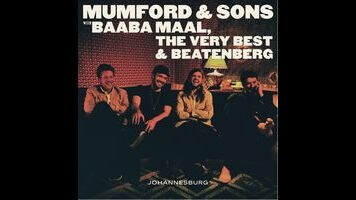Mumford & Sons take auxiliary role in Afropop adventure

The controversies spawned by Paul Simon’s Graceland have never quite gone away; for some, white Western dudes co-opting traditional African music is just too suggestive of colonialism for comfort. But part of that skepticism has to come from Simon’s using the record to establish his pop-icon prominence—particularly in light of the substantial contributions from other established native musicians that got limited, sometimes belated, recognition for it. More than a quarter-century after Graceland, those issues still loom in the background as international rock stars Mumford & Sons (like it or not, the label applies) release their own African foray with the mini-album Johannesburg.
There’s far less cause for uproar here, however: The London foursome go to admirable lengths to acknowledge and showcase their collaborators, making Johannesburg a true partnership rather than a novelty by faux-worldly hotshots. Resulting from Mumford & Sons’ extensive tour of South Africa and recorded in two whirlwind days at the South African Broadcasting Corporation, the album largely draws from stage-mate The Very Best’s Afrobeat rhythms and production aesthetics and sharp execution by Beatenberg, a talented pop band that’s relatively unknown outside of the country.
So what does Mumford & Sons bring to the table? They’re not just along for the ride—their interest in this stuff comes off as entirely genuine, and, though they’re quick to admit to taking the backseat in many ways, these songs conspicuously carry their stamp. “There Will Be Time” and “Ngamila” follow the band’s omnipresent drama-building, soft-loud format, lurching from a delicate intro to a belted, passionate chorus. “Wona” initially borrows from Vampire Weekend with its bright Afropop guitar lines, but eventually works in Mumford & Sons’ recent affection for arena rock. And the slick, coolly catchy “Fool You’ve Landed” is a refreshing break from the band’s mold in every way. Keeping things grounded in the record’s continental surroundings are compelling vocal additions from Baaba Maal and traditional chants and harmonies throughout.
Mumford & Sons made it clear on their last trad-rock dud, Wilder Mind, that they wanted to move beyond the pseudo-Americana stomp-folk that made them famous. But that album was clearly less about experiencing something different and more about being something different. Johannesburg’s thrills develop as the band participates in and gently incorporates something unfamiliar—without claiming ownership of it.